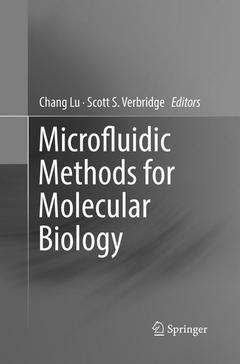Description
Microfluidic Methods for Molecular Biology, Softcover reprint of the original 1st ed. 2016
Language: English
Subjects for Microfluidic Methods for Molecular Biology:
Microfluidic Methods for Molecular Biology
Publication date: 05-2018
Support: Print on demand
Publication date: 05-2018
Support: Print on demand
Microfluidic Methods for Molecular Biology
Publication date: 05-2016
Support: Print on demand
Publication date: 05-2016
Support: Print on demand
Description
/li>Contents
/li>Biography
/li>Comment
/li>
This book covers the state-of-the-art research on molecular biology assays and molecular techniques enabled or enhanced by microfluidic platforms. Topics covered include microfluidic methods for cellular separations and single cell studies, droplet-based approaches to study protein expression and forensics, and microfluidic in situ hybridization for RNA analysis. Key molecular biology studies using model organisms are reviewed in detail. This is an ideal book for students and researchers in the microfluidics and molecular biology fields as well as engineers working in the biotechnology industry.
This book also:
- Reviews exhaustively the latest techniques for single-cell genetic, epigenetic, metabolomic, and proteomic analysis
- Illustrates microfluidic approaches for inverse metabolic engineering, as well as analysis of circulating exosomes
- Broadens readers? understanding of microfluidics convection-based PCRtechnology, microfluidic RNA-seq, and microfluidics for robust mobile diagnostics
Microfluidic Platforms for Quantitative Biology Studies in Model Organisms.- Microfluidic Methods in Single Cell Biology.- Convective PCR Thermocycling with Smartphone-based Detection: A Versatile Platform for Rapid, Inexpensive, and Robust Mobile Diagnostics.- Forensic Typing of Single Cells using Droplet Microfluidics.- Microfluidic Approaches to Fluorescence In Situ Hybridization (FISH) for Detecting RNA targets in Single Cells.- Microfluidic Multistage Integration for Analysis of Circulating Exosomes.- Microfluidic Single-Cell Functional Proteomics.- Microfluidics for DNA and Protein Analysis with Multiplex Microbead-based Assays.- Single Cell Phenotypic Screening in Inverse Metabolic Engineering.- Microfluidic Paper-based Multiplexing Biosensors for Electrochemical Detection of Metabolic Biomarkers.- Droplet Microfluidics for Screening of Surface-Marker and Secretory Protein Expression.- Wire-guided Droplet Manipulation for Molecular Biology.- Mechanical and Electrical Principles for Separation of Rare Cells.- Microfluidics for High Throughput Cellular Isolation and Analysis in Biomedicine.- Microfluidics for Cell Culture.- Microfluidic Chromatin Immunoprecipitation for Analysis of Epigenomic Regulations.
Chang Lu is a Professor of Chemical Engineering at Virginia Tech. His research focuses on developing microfluidic biotechnologies for cellular and molecular analysis with recent emphasis on low-input epigenomic studies. Scott Verbridge is an Assistant Professor in the Virginia Tech Department of Biomedical Engineering and Mechanics, and the Virginia Tech - Wake Forest School of Biomedical Engineering and Sciences. His research is focused on developing engineered tumor models to better understand cell-microenvironment interactions, and their impact on tumor progression and therapy response.
Reviews exhaustively the latest techniques for single-cell genetic, epigenetic, metabolomic, and proteomic analysis Illustrates microfluidic approaches for inverse metabolic engineering, as well as analysis of circulating exosomes Broadens readers’ understanding of microfluidics convection-based PCR technology, microfluidic RNA-seq, and microfluidics for robust mobile diagnostics Includes supplementary material: sn.pub/extras
© 2024 LAVOISIER S.A.S.




